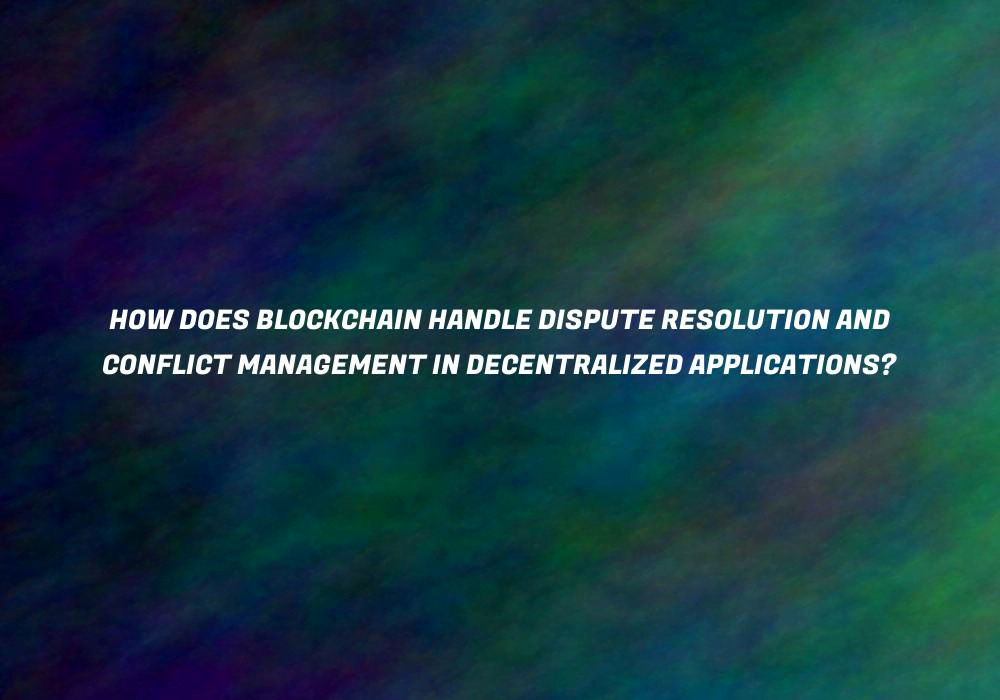In the rapidly evolving world of decentralized applications, one important question arises: how does blockchain handle dispute resolution and conflict management? With the rise of blockchain technology, decentralized applications (dApps) have gained popularity for their ability to operate without the need for a centralized authority. However, this decentralized nature also presents challenges when it comes to resolving disputes and managing conflicts. This article explores the unique features of blockchain that allow for effective dispute resolution and conflict management in decentralized applications.
Blockchain and Decentralized Applications
Blockchain technology has emerged as a revolutionary force in the digital ecosystem, enabling decentralized applications (DApps) to operate in a transparent, secure, and efficient manner. Unlike traditional centralized systems, blockchain leverages distributed ledger technology to ensure accountability and trust among its participants. This article delves into the challenges faced by dispute resolution in decentralized applications and explores how the unique features of blockchain technology play a crucial role in addressing these challenges.
Challenges with Dispute Resolution in Decentralized Applications
Dispute resolution in decentralized applications presents a unique set of challenges. Traditional methods of resolving conflicts, such as legal systems and centralized authorities, are not readily applicable in the decentralized realm. One major obstacle lies in the absence of a central intermediary to oversee and enforce resolutions. Additionally, the lack of clear jurisdictional boundaries and legal frameworks further complicates the resolution process. These challenges necessitate the adoption of innovative approaches to dispute resolution within the blockchain ecosystem.
Smart Contracts and Self-Execution
Smart contracts, a fundamental component of blockchain technology, hold immense potential for automating dispute resolution in DApps. By enforcing predetermined rules and conditions, smart contracts enable self-execution of agreements without the need for intermediaries. In the context of dispute resolution, smart contracts can codify the terms and conditions for resolving conflicts effectively. When a dispute arises, the smart contract can automatically trigger predefined actions tailored to the resolution process, providing a streamlined and autonomous framework.
Immutability of Blockchain
The immutability of blockchain, a key feature derived from its distributed nature, plays a significant role in dispute resolution within DApps. Once a transaction or agreement is recorded on the blockchain, it becomes virtually impossible to alter or tamper with the data. This unalterable record can serve as concrete evidence during dispute resolution. Parties involved can refer to the blockchain’s transparent and traceable immutability to ascertain the accuracy and validity of transactions, strengthening the overall integrity of the resolution process.
Transparency and Audibility
Another vital attribute of blockchain technology is transparency. Every transaction and operation on the blockchain is visible to all participating nodes, ensuring a high level of transparency. This transparency facilitates the auditing and verification of transactions, making it easier to identify and resolve disputes. By providing an auditable trail of actions, blockchain technology promotes a fair and accountable dispute resolution process, reducing the potential for fraud or manipulation.
Consensus Mechanisms and Trust
Blockchain’s consensus mechanisms, such as Proof of Work (PoW) and Proof of Stake (PoS), contribute to establishing trust and reliability in resolving disputes. These mechanisms ensure that all participants agree on the validity of transactions, preventing any single party from having the power to manipulate or reverse decisions. By involving multiple stakeholders in the consensus process, blockchain fosters a decentralized environment that promotes fairness and trust among its users, enhancing the credibility of dispute resolution outcomes.
Arbitration and Mediation
While blockchain’s inherent features offer a foundation for automated dispute resolution, there are cases where human intervention may still be required. Arbitration and mediation can play crucial roles in resolving complex disputes that cannot be solely addressed by smart contracts. Blockchain technology can facilitate these processes by ensuring transparency, secure document storage, and immutable evidence presentation. By combining the benefits of human expertise with blockchain’s efficiency and transparency, arbitration and mediation can provide effective dispute resolution mechanisms within DApps.
Decentralized Autonomous Organizations (DAOs)
Decentralized Autonomous Organizations (DAOs), built on blockchain technology, introduce new models for governance and decision-making. These organizations operate on smart contracts and can potentially handle dispute resolution autonomously. DAOs allow stakeholders to participate in the decision-making process, redistributing power and providing a decentralized approach to dispute resolution. By leveraging the consensus mechanisms and immutability of blockchain, DAOs can provide fair and transparent resolutions in a manner that aligns with the interests of the participants.
Implementing Governance Structures
To ensure effective dispute resolution in decentralized applications, the implementation of governance structures is crucial. These structures establish the rules, procedures, and mechanisms necessary to address conflicts in a timely and fair manner. By defining clear guidelines for dispute resolution, DApps can prevent misunderstandings and minimize potential conflicts. Additionally, the integration of decentralized governance models, such as liquid democracy or quadratic voting, can further enhance the legitimacy and efficiency of dispute resolution processes within the blockchain ecosystem.
Future Innovations and Research
As blockchain technology continues to evolve, so too will its capabilities in handling dispute resolution and conflict management in decentralized applications. Ongoing research and development are focused on improving scalability, privacy, and efficiency in blockchain systems. Additionally, advancements in artificial intelligence and machine learning may help automate and optimize dispute resolution, reducing the need for human intervention. Collaboration between legal and technological experts will be crucial in shaping future innovations that address the unique challenges of dispute resolution within the decentralized realm.
In conclusion, blockchain technology presents both opportunities and challenges in the realm of dispute resolution and conflict management within decentralized applications. Through the use of smart contracts, immutability, transparency, consensus mechanisms, and innovative governance structures, blockchain offers a promising framework for efficient and fair dispute resolution. As the technology continues to evolve, it is essential to keep exploring innovative strategies and research to further refine and enhance the dispute resolution capabilities of blockchain in the future.
